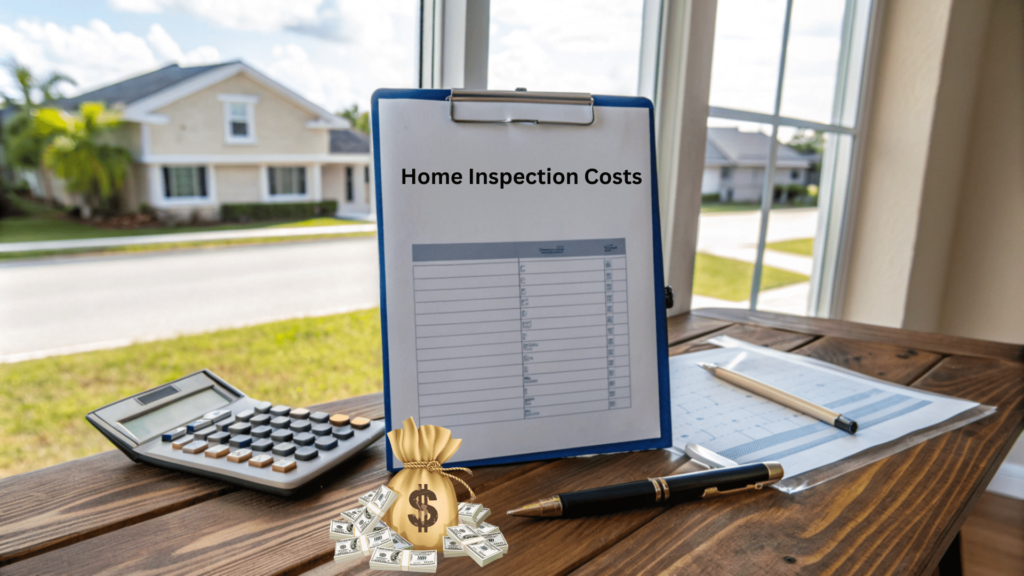When buying a home in Florida, one of the most important steps is getting a home inspection—but many buyers aren’t sure what to expect when it comes to home inspection cost in Florida. The cost of a home inspection can vary widely based on several factors, including the size and age of the home, its location, and the type of inspection required. In this guide, we’ll explore the key factors that influence home inspection cost in Florida, helping you understand what to expect and how to plan for this essential part of the home-buying process. Whether you’re a first-time buyer or a seasoned investor, having a clear idea of inspection costs can help you budget wisely and avoid surprises.
Table of Contents
ToggleWhat Are home inspection cost Florida?
Home inspection costs are significant because they provide a detailed assessment of a property’s condition before buying or selling. Understanding these costs helps potential buyers make informed decisions about their investments, as a thorough inspection can reveal hidden issues such as structural problems, electrical hazards, or plumbing leaks. This knowledge not only aids in negotiating the purchase price but also helps buyers budget for necessary repairs, ultimately protecting them from unexpected expenses in the future. Moreover, knowing the cost of inspections can encourage sellers to address issues proactively, potentially increasing the property’s market value and ensuring a smoother transaction process.
Key Factors Affecting Home Inspection Costs
1. Property Size
Larger Homes Cost More: Inspection costs typically increase with the square footage of the property.
Example: A 1,500 sq. ft. home may cost $300–$400 to inspect, while a 3,000 sq. ft. home could range from $500–$600.
Why It Matters: Larger homes have more systems and features to inspect, requiring additional time and expertise.
2. Location
Urban vs. Rural Areas: Inspections in metropolitan areas like Miami or Orlando may cost more due to higher demand, whereas rural locations may have lower fees but limited inspector availability.
Travel Fees: If the property is in a remote area, inspectors may charge extra for travel expenses.
3. Age and Condition of the Home
Older Homes Require More Scrutiny: Homes built before the 1980s may have outdated wiring or plumbing, requiring a more thorough inspection.
Cost Impact: Expect to pay $50–$100 more for older properties.
Renovated Properties: Newly renovated homes may also require specialized checks to verify the quality of upgrades.
4. Additional Services
Home inspections aren’t one-size-fits-all. Additional services can significantly increase costs:
-
- Termite Inspection: Add $50–$100.
-
- Mold Testing: Costs $200–$300 depending on the scope.
-
- Pool Inspection: An extra $100–$150.
-
- Wind Mitigation Report (important for Florida): $75–$150.
Average Costs of Home Inspections in Florida
-
- Standard Homes: Most home inspections in Florida cost between $300 and $500. This covers a typical single-family home.
- Luxury Properties: If the home is worth over $1 million, the inspection fee is higher, usually between $700 and $1,000, because the property is larger or more complex.
- Condominiums: Condo inspections are usually less expensive, averaging $200 to $300, since condos are smaller and simpler to inspect.
Comparative Examples of Inspection Costs

How to Save on Home Inspection Fees
Here are some practical tips to minimize costs without compromising quality:
- Compare Prices: Check out a few home inspectors in your area and compare their quotes. It’s like shopping for the best deal!
- Choose Packages: Look for inspectors who bundle services. For example, some might combine a general inspection with termite or mold testing for a lower total price.
- Add a Wind Mitigation Report: If you’re in an area prone to storms, ask for a wind mitigation report. Some inspectors will give you a discount when you add this to your standard inspection.
- Ask the Seller to Pay: If you’re in a competitive market, try negotiating with the seller to cover the inspection fees as part of the deal.
Bottom Line:
Home inspections in Florida are a smart investment, offering valuable insights to protect your purchase. By understanding the costs and factors involved, you can budget wisely, negotiate effectively, and ensure a smooth transaction. A little upfront expense can save you from costly surprises down the road.
FAQs About Home Inspection Costs in Florida
Can I skip a home inspection to save money?
Skipping an inspection might save you upfront costs but could lead to expensive surprises later. It’s an investment in peace of mind.
Are inspection costs tax-deductible?
Generally, no. However, they may be deductible for rental or investment properties. Consult a tax advisor for specifics.
How long does an inspection take?
Most inspections take 2–4 hours, depending on property size and services needed.
